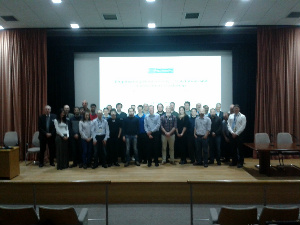By Geraint Jones
An Engineering Nonlinearity (ENL) Workshop on  (V&V) took place in the Lecture Theatre at EDF Energy’s impressive Conference Centre facilities in Barnwood, Gloucestershire on the 19th and 20th March 2015, co-organised by Dr Mark Bateman of EDF Energy, and Drs Ifigenia Antoniadou and Rob Barthorpe of the University of Sheffield. Around 40 attendees drawn from the ENL academic and industrial partners, including a strong representation from EDF Energy itself, listened to presentations and participated in workshops around the “V&V” theme.
(V&V) took place in the Lecture Theatre at EDF Energy’s impressive Conference Centre facilities in Barnwood, Gloucestershire on the 19th and 20th March 2015, co-organised by Dr Mark Bateman of EDF Energy, and Drs Ifigenia Antoniadou and Rob Barthorpe of the University of Sheffield. Around 40 attendees drawn from the ENL academic and industrial partners, including a strong representation from EDF Energy itself, listened to presentations and participated in workshops around the “V&V” theme.
Dr Mark Bateman of EDF Energy, an ENL Steering Committee member, welcomed everyone to EDF Energy and day 1 of the workshop, and touched on the importance of V&V in helping his industry to make informed decisions based on potential risks from available modelled data.
Prof. David Wagg, ENL Principal Investigator, continued with an overview of the Engineering Nonlinearity programme, and then handed over to the first speaker, Dr Francois Hemez of Los Alamos National Laboratory, who gave an excellent overview of “Verification and Validation of Nonlinear Dynamics Simulations”, showing clearly the potential practical advantages of taking an active V&V based approach.
Prof. Tony O’Hagan, Emeritus Professor of Statistics (University of Sheffield), then gave a statistician’s angle in his talk “All models are wrong, so how can they be valid?” which provoked much debate about the importance of definitions and understanding of key terms.
A talk on “Retaining Physical Meaning in Identified Models” followed from Prof Mike Friswell, an ENL investigator, including a look at Inverse Problems, where measured data is used to estimate model parameters.
Dr Bob Stirling of Stirling Dynamics gave an extra presentation just before lunch, showing an ingenious solution provided by his company to mitigate occasional non-linear behaviour from airborne aircraft refuelling hoses.
Dr Scott Cogan of the University of Franche-Comte opened up proceedings after lunch with at talk entitled “Robust decision-making in design and model validation”. This talk spurred further debate around what assumptions could or should be made given a certain “Engineering Knowledge”, and which parameters should be considered to be essentially unknown or weakly constrained.
Co-organiser Dr Ifigenia Antoniadou of the University of Sheffield continued on a theme of “Systems Engineering: Ontologies for Verification and Validation”, outlining a powerful classification mechanism which can be applied in a V&V context.
Another visitor from Los Alamos National Laboratory, Dr Kendra Van Buren, presented on “Sensitivity analysis and uncertainty qualification applied to a very nonlinear model of flight dynamics”, demonstrating the possibility of applying V&V related methodologies to nonlinear problems.
The formal part of day 1 was brought to a close by two presentations from the host organisation, EDF Energy.
Dr Mark Bateman expanded on the theme he had touched on in his introduction in his presentation “Validation and Verification – Generic V&V Issues from an Industrial Perspective”.
Neil McLachlan then spoke on “Graphite Core Modelling and Validation”, referencing the PLEX project which matches modelled data with experimental measurement from a scale experimental setup on the shaking table at the University of Bristol.
For those able to attend, informal discussions continued over a meal at Zizzi’s in nearby Cheltenham.
Delegates were welcomed back on day 2 by Mark Bateman and David Wagg, followed by co-organiser Dr Rob Barthorpe’s presentation “Applications of Model Validation in Structural Health Monitoring” which looked at some of the challenges of applying V&V techniques in cases where validation data may be unavailable.
Dr Simon Hancock of Stirling Dynamics continued proceedings with “Nonlinear Damping in a Wing Strucure”, highlighting some of the challenges for V&V in a nonlinear context.
A presentation “Modelling and Validation of Control Rod Actuators” followed from Malcolm Scott, a PhD student at the University of Sheffield, outlining some work done in conjunction with EDF Energy.
The attendees then split into three workshop groups to explore:
– What tools and techniques could be developed to support industry?
– What is available now that industry may not be aware of?
– What could be developed on the timescales of the ENL project?
– What might be developed in the longer term?
Mark Bateman and David Wagg then summarised the workshop findings, and drew proceedings to a close by thanking the organisers and everybody for coming.